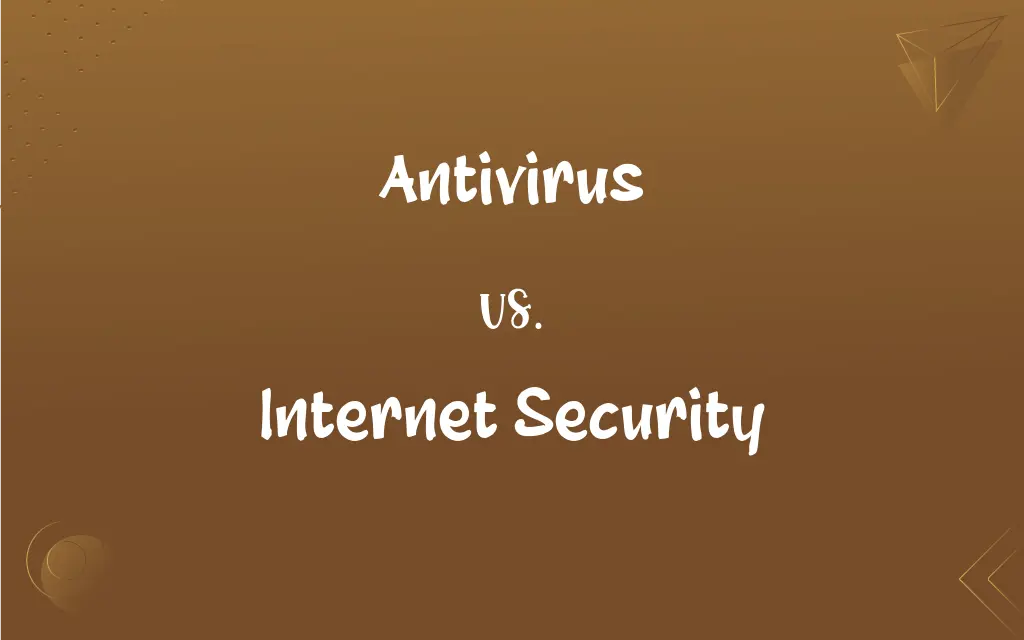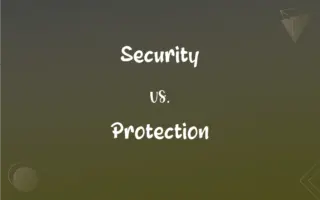Antivirus vs. Internet Security: What's the Difference?
Edited by Aimie Carlson || By Harlon Moss || Updated on October 26, 2023
Antivirus is software that detects and removes malicious software, while internet security is a broader term encompassing various tools to protect online activities and data.

Key Differences
Antivirus and internet security are two essential concepts in the realm of computer safety, with one focusing primarily on software threats and the other on a broader spectrum of online threats. Antivirus software is primarily designed to scan, identify, and eradicate malicious software (malware) such as viruses, worms, and trojans. In contrast, internet security suites offer a range of tools to protect not only against malware but also against threats encountered during online activities, such as phishing, hacking, and identity theft.
Antivirus tools are fundamental components of any security strategy, operating typically by comparing files to a database of known malware signatures and monitoring system behavior for any suspicious activity. Internet security, on the other hand, might include additional features like firewalls, email protection, anti-phishing tools, and parental controls. These tools collectively ensure that users have a safe browsing experience, safeguarding personal data from potential breaches.
While the primary function of antivirus is to guard against malicious software infiltrations, internet security extends its protective measures to real-time online threats. For instance, while an antivirus might catch and neutralize a downloaded malware file, internet security can warn a user about a compromised website or prevent them from entering personal data into a fake banking site.
The world of cyber threats is ever-evolving, and while having antivirus software is critical, relying solely on it might leave other vulnerabilities exposed. Hence, many users opt for comprehensive internet security suites that integrate antivirus protection within them, ensuring a holistic shield against a wider array of potential threats.
Comparison Chart
Primary Focus
Detecting and removing malware.
Comprehensive protection for online activities and data.
ADVERTISEMENT
Core Functionality
Scans files for known malware signatures.
Includes firewalls, anti-phishing tools, and more.
Threat Coverage
Mainly viruses, worms, trojans.
Phishing, hacking, identity theft, and malware.
Integration
Can be part of an internet security suite.
Typically includes antivirus as a component.
Usage Scope
More specific to software threats.
Broader protection against various online threats.
Antivirus and Internet Security Definitions
Antivirus
Software that detects malicious software.
I installed an antivirus program to protect my computer from viruses.
ADVERTISEMENT
Internet Security
Guards against phishing, hacking, and identity theft.
Thanks to my internet security tools, I was alerted about a phishing email before I clicked on the link.
Antivirus
Compares files to known malware signatures.
The antivirus scans each file against its database to find matches.
Internet Security
Includes protections like firewalls and email filters.
The internet security suite I use has a robust firewall that blocks suspicious incoming connections.
Antivirus
Monitors system behavior for suspicious activities.
The antivirus alerted me when a software tried to access a protected folder.
Internet Security
Often integrates antivirus components.
My internet security suite comes with a built-in antivirus for comprehensive protection.
Antivirus
A tool that removes detected threats.
My antivirus detected a trojan and successfully removed it.
Internet Security
Provides safe browsing features.
The internet security software warned me about a compromised website I was about to visit.
Antivirus
Often updates to recognize new threats.
It's essential to keep the antivirus updated for the best protection.
Internet Security
A suite of tools protecting online activities.
I invested in internet security software to safeguard my online transactions.
Antivirus
Of or relating to a software program designed to identify and remove known or potential computer viruses.
Antivirus
(computing) A piece of software that is used to detect, delete and or neutralize computer-based viruses.
FAQs
How does internet security differ from antivirus?
While both aim to protect against malicious threats, antivirus focuses on malware detection and removal, whereas internet security provides a broader range of protection, including firewall, email filtering, and anti-phishing features.
What is internet security?
Internet security refers to a broader set of measures and tools designed to protect users and systems from online threats, including malware, phishing attacks, hacking, and other cyber threats.
What is an antivirus?
An antivirus is software designed to detect, prevent, and remove malicious software (malware) from computer systems and networks.
What are false positives in antivirus scanning?
A false positive occurs when antivirus software mistakenly identifies a legitimate file or action as malicious.
Are antivirus and internet security solutions foolproof?
No solution offers 100% protection. It's essential to stay informed, practice safe browsing habits, and regularly back up data in addition to using security software.
What is a VPN, and how does it relate to internet security?
A VPN (Virtual Private Network) allows users to create a secure connection to another network over the internet. It enhances privacy and can protect against certain online threats.
How does an antivirus work?
Antivirus software scans files, system memory, and system behaviors for patterns that match known malware signatures. It also uses heuristic analysis to identify new or modified malware strains.
Why is antivirus software necessary?
Antivirus software helps protect computers and networks from potential threats, ensuring data integrity and preventing unauthorized access or data theft.
Can I use multiple antivirus programs simultaneously?
It's generally not recommended as they can conflict with each other, causing system instability and performance issues.
How often should I update my antivirus and internet security software?
Regularly. Updates often include new threat definitions and improvements. Enabling automatic updates ensures optimal protection.
How can I safely shop or bank online?
Use reputable internet security software, ensure the website starts with "https://" (indicating a secure connection), and be wary of unsolicited emails or links.
How does sandboxing help in antivirus and internet security?
Sandboxing runs suspicious files in a virtual environment, isolated from the main system, to observe their behavior without risking actual system compromise.
What are the common types of malware?
Common types include viruses, worms, trojans, ransomware, spyware, adware, and rootkits.
Do mobile devices need antivirus protection?
Yes. Mobile devices are susceptible to malware, especially when downloading apps from untrusted sources or browsing insecure websites.
What is a firewall in the context of internet security?
A firewall is a network security device or software that monitors and filters incoming and outgoing network traffic based on security policies.
Are free antivirus and internet security solutions reliable?
Some free solutions offer decent protection, but they may lack advanced features or come with ads. It's essential to choose reputable providers.
Why do some websites get blocked by internet security software?
They might be flagged for hosting malicious content, being involved in phishing attempts, or having a poor reputation.
Is it necessary to have both antivirus and internet security?
For comprehensive protection, it's advisable to have both. While an antivirus protects against malware, internet security offers additional layers of protection against various online threats.
What is phishing, and how does internet security help?
Phishing is a fraudulent attempt to obtain sensitive information by posing as a trustworthy entity. Internet security software often includes anti-phishing tools to detect and block such attempts.
Can antivirus detect all types of malware?
No antivirus can guarantee 100% detection of all malware, but a good antivirus will detect most known threats and employ heuristic analysis to identify suspicious unknown files.
About Author
Written by
Harlon MossHarlon is a seasoned quality moderator and accomplished content writer for Difference Wiki. An alumnus of the prestigious University of California, he earned his degree in Computer Science. Leveraging his academic background, Harlon brings a meticulous and informed perspective to his work, ensuring content accuracy and excellence.
Edited by
Aimie CarlsonAimie Carlson, holding a master's degree in English literature, is a fervent English language enthusiast. She lends her writing talents to Difference Wiki, a prominent website that specializes in comparisons, offering readers insightful analyses that both captivate and inform.































































